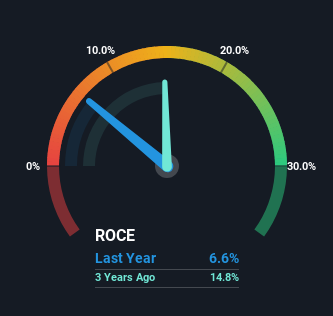- Japan
- /
- Hospitality
- /
- TSE:3772
Returns On Capital At Wealth Management (TSE:3772) Paint A Concerning Picture
What are the early trends we should look for to identify a stock that could multiply in value over the long term? Typically, we'll want to notice a trend of growing return on capital employed (ROCE) and alongside that, an expanding base of capital employed. Put simply, these types of businesses are compounding machines, meaning they are continually reinvesting their earnings at ever-higher rates of return. Having said that, from a first glance at Wealth Management (TSE:3772) we aren't jumping out of our chairs at how returns are trending, but let's have a deeper look.
Return On Capital Employed (ROCE): What Is It?
If you haven't worked with ROCE before, it measures the 'return' (pre-tax profit) a company generates from capital employed in its business. To calculate this metric for Wealth Management, this is the formula:
Return on Capital Employed = Earnings Before Interest and Tax (EBIT) ÷ (Total Assets - Current Liabilities)
0.066 = JP¥3.1b ÷ (JP¥54b - JP¥7.2b) (Based on the trailing twelve months to December 2024).
Therefore, Wealth Management has an ROCE of 6.6%. Ultimately, that's a low return and it under-performs the Hospitality industry average of 9.7%.
See our latest analysis for Wealth Management

While the past is not representative of the future, it can be helpful to know how a company has performed historically, which is why we have this chart above. If you're interested in investigating Wealth Management's past further, check out this free graph covering Wealth Management's past earnings, revenue and cash flow.
The Trend Of ROCE
When we looked at the ROCE trend at Wealth Management, we didn't gain much confidence. To be more specific, ROCE has fallen from 10% over the last five years. However, given capital employed and revenue have both increased it appears that the business is currently pursuing growth, at the consequence of short term returns. If these investments prove successful, this can bode very well for long term stock performance.
Our Take On Wealth Management's ROCE
In summary, despite lower returns in the short term, we're encouraged to see that Wealth Management is reinvesting for growth and has higher sales as a result. And long term investors must be optimistic going forward because the stock has returned a huge 159% to shareholders in the last five years. So while the underlying trends could already be accounted for by investors, we still think this stock is worth looking into further.
One more thing: We've identified 2 warning signs with Wealth Management (at least 1 which is a bit unpleasant) , and understanding them would certainly be useful.
While Wealth Management isn't earning the highest return, check out this free list of companies that are earning high returns on equity with solid balance sheets.
Valuation is complex, but we're here to simplify it.
Discover if Wealth Management might be undervalued or overvalued with our detailed analysis, featuring fair value estimates, potential risks, dividends, insider trades, and its financial condition.
Access Free AnalysisHave feedback on this article? Concerned about the content? Get in touch with us directly. Alternatively, email editorial-team (at) simplywallst.com.
This article by Simply Wall St is general in nature. We provide commentary based on historical data and analyst forecasts only using an unbiased methodology and our articles are not intended to be financial advice. It does not constitute a recommendation to buy or sell any stock, and does not take account of your objectives, or your financial situation. We aim to bring you long-term focused analysis driven by fundamental data. Note that our analysis may not factor in the latest price-sensitive company announcements or qualitative material. Simply Wall St has no position in any stocks mentioned.
About TSE:3772
Proven track record with mediocre balance sheet.
Market Insights
Community Narratives




